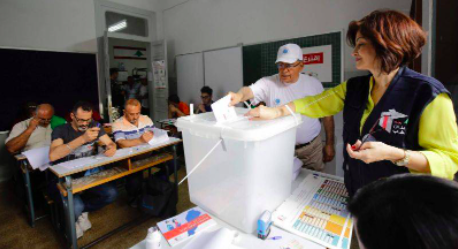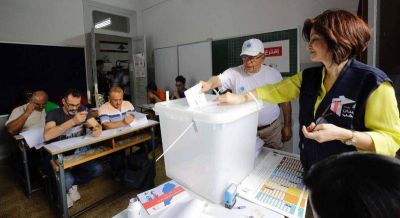
A polling station in Beirut during the 2018 legislative elections. (Credit: Ibrahim Chalhou/AFP)
Four months after Interior Minister Bassam Mawlawi issued a decree on Nov. 30, 2021, appointing 219 judges and 36 substitutes to sit on committees charged with verifying the proper conduct of the legislative elections, scheduled for May 15, 42 of them (36 judicial judges and six from the Council of State) have chosen to recuse themselves.
Justice Minister Henri Khoury told L'Orient-Le Jour that he received the recusal requests a few weeks ago and transferred them to Mawlawi.
Since Article 40 of the electoral law was amended in November 2021, the appointment of magistrates to the positions of heads and members of the commissions has been the sole responsibility of the Interior Minister, whereas the latter previously stated that this was the prerogative of the Justice Minister.
Some pundits expressed concerns that the electoral process would be torpedoed if magistrates were absent from the electoral commissions, even though their presence is mandatory.
This is especially true since other requests for recusal could follow, and the withdrawals that have already taken place have been en masse, unlike the rather scattered withdrawals observed during previous legislative elections.
A source close to the Supreme Judicial Council — the body responsible for presenting the Interior Minister with a list of magistrates to be appointed — dismissed the possibility that these withdrawals will undermine the election, and told L’Orient-Le Jour that the council is working to quickly replace those who have withdrawn.
Accused by some media outlets of having taken a position against the participation of magistrates in the commissions to prevent the holding of elections, the Judges Club issued a statement on Sunday denying these claims.
“We are committed to the sacred right of the citizens to vote in the elections to be held on time,” the statement said.
“The magistrates who decided not to fulfill the mission entrusted to them acted individually. This is not a collective decision,” Paula Haykal, president of the association, told L'Orient-Le Jour.
“The choice of those who abstained is legitimate, this mission being additional work, and not intrinsic to the function of a judge,” she added.
Until dawn
The reasons behind these withdrawals are varied.
For some, the voting centers to which they were assigned are far from their place of residence, according to one magistrate who spoke to L’Orient-Le Jour, adding that she could not leave her young children to go “to the other side of the country,” without specifying the area where she was assigned.
Her colleague mentioned the exorbitant price of gas for a trip to “a distant constituency” where he was assigned to perform his task.
Other judges feel that the remuneration offered was insufficient.
“We are paid very little for the work we are asked to do until dawn,” said one judge.
The commissioners begin their work in the evening, after the polls close.
The polling stations send the ballot envelopes to the primary commissions, each of which is composed of a magistrate who chairs it and two members, a municipal president and a civil servant in the Vital Records Department.
These commissions make the necessary verifications and send their reports to the higher commissions, made up exclusively of magistrates.
If, at this second stage, candidate delegates object to any points of the vote count, the judges begin new reading and tallying operations (blank ballots, invalid ballots, etc.), before ruling on the falsifications and other likely infringements.
It is then that the results are proclaimed, the very ones that the Interior Minister would announce.
‘Who would do the job?’
In addition to the remoteness of the polling stations, the price of fuel and insufficient remuneration, some magistrates are not even convinced of the mission assigned to them, doubting that it will allow them to identify if any violations are committed.
“The polling stations are staffed by civil servants, often recruited through their clientelist relationships with politicians,” said a judge, noting that “the results can easily be falsified during the counting of votes.”
“The ballots are printed, but their content is then manually transposed by the heads of the polling stations, who may, for example, assign priority votes to candidates other than those chosen by the voters,” he explained.
“The candidates of the ruling class are now so embarrassed that they will encourage their henchmen to cheat much more than in the past,” he said.
“I don't want to be a false witness,” another magistrate said, fearing “power cuts during which ballot rigging could take place.”
Meanwhile, another judge said that he had “many reservations about the electoral process.” But he believes that “the counting of votes can be controlled at the polling station level, because it is done in the presence of delegates of opposing candidates.”
He intends in any case to present himself at his post on election day, considering that it is a question of doing his “duty.”
Another magistrate, who shares the same view, expressed his radical opposition to the electoral law, because according to him, “it will bring back the same politicians to Parliament.”
“I challenge the law as a citizen, but as a magistrate, I have an obligation to apply it,” he said.
“Everyone must fulfill their role according to their legal competencies,” he stressed, before asking, “If not, who would do the job?”
This article was originally published in French in L'Orient-Le Jour.
